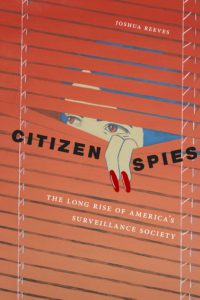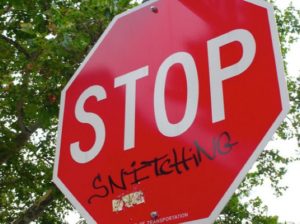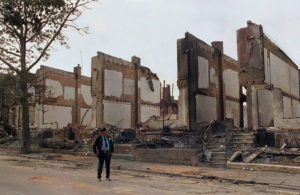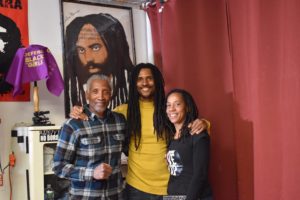Podcast: Play in new window | Download
Citizen Spies: The Long Rise of America’s Surveillance Society
The U.S. Department of Homeland Security’s program “If You See Something, Say Something,” launched in 2010, urges citizens to be aware of and to report, potential threats. Examples of suspicious activity include unattended packages or baggage; circumstances that appear out of the ordinary, like an open door that is usually closed; a person asking for detailed information about a building’s layout or purpose, and changes in security protocol or shifts. Also of concern is any person seen loitering around a building, writing notes, sketches, and taking photographs or measurements.
The DHS website is careful to note that, “Factors such as race, ethnicity, and/or religious affiliation are not suspicious.” Yet as listeners know, incidents of ethnic profiling are many, including one in which a Southwest Airlines passenger was taken off a flight for speaking Arabic.
The history of citizen spying and reporting on others is not new in this country. And the “See Something” campaign isn’t the only civilian spying program around. Many jurisdictions have Neighborhood Watch programs. The U.S. Department of Justice’s National Neighborhood Watch initiative enlists community members to assist crime prevention and to prepare neighborhoods for disasters and emergency response.
Guest – Joshua Reeves author of Citizen Spies, The Long Rise of America’s Surveillance Society . He is associate professor of New Media Communications and Speech Communication at Oregon State University, where he’s also a fellow in their Center for the Humanities. An associate editor of the journal Surveillance and Society, he’s also written the just-released book, Killer Apps: War, Media, Machine.
—-
Former Philadelphia Mayor Calls For A Formal Apology To MOVE
The former Philadelphia mayor who led the city when police dropped a bomb on the MOVE house in 1985 has called for a formal apology from the city. The bomb and subsequent fire killed 11 people and destroyed more than 60 homes in the neighborhood. Five children were among the 11 who died.
Former mayor W. Wilson Goode Sr. said in an op-ed in the Guardian that “after 35 years it would be helpful for the healing of all involved, especially the victims of this terrible event.”
After dropping an explosive from a helicopter, the Philadelphia Fire Department let the fire burn, knowing there were men, women and children inside. Goode insists he knew nothing about police and fire department’s plan of action even though he was ultimately responsible for the actions.
Ramona Africa, one of the survivors, has described police opening fire on MOVE members trying to flee the burning home.
Janine Africa, who was one of nine MOVE members sentenced to between 30 and 100 years in prison and who served 41 years of that sentence in the 1978 shooting death of Officer James Ramp, maintains her innocence but said she and other MOVE members were judged on alleged actions of one day. MOVE members have said they believe that Ramp was shot by friendly fire.
Former Gov. Ed Rendell, who succeeded Goode as mayor and was the district attorney who prosecuted MOVE members, told The Philadelphia Inquirer that he now regrets his handling of the prosecution of some members. He said if he had to do it over again, he would have offered those who weren’t leaders plea deals that included less severe sentences.
“I followed the law, but the prosecutor always has the discretion to use their judgment,” Rendell said. “For what they did compared to what some other people do in Philadelphia, they served far too much time.”
Guest – Mike Africa Jr. Founder of Seeds of Wisdom, Musician, Instagram Account
—————–
—————–




